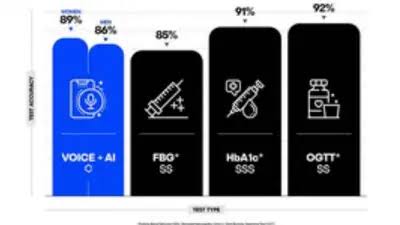New Delhi: Determining whether a person is diabetic could be as easy as having them speak a few sentences into their smartphone, according to a groundbreaking study that combines voice technology with artificial intelligence in a major step forward in diabetes detection.
Scientists from Klick Labs in the US used six to 10 seconds of people’s voice, along with basic health data, including age, sex, height, and weight, to create an AI model that can distinguish whether that individual has Type 2 diabetes.
The model, detailed in the journal Mayo Clinic Proceedings: Digital Health, has 89 per cent accuracy for women and 86 per cent for men.
For the study, researchers asked 267 people (diagnosed as either non- or Type 2 diabetic) to record a phrase into their smartphone six times daily for two weeks. From more than 18,000 recordings, scientists analysed 14 acoustic features for differences between non-diabetic and Type 2 diabetic individuals.
“Our research highlights significant vocal variations between individuals with and without Type 2 diabetes and could transform how the medical community screens for diabetes,” said Jaycee Kaufman, first author of the paper and research scientist at Klick Labs. “Current methods of detection can require a lot of time, travel, and cost. Voice technology has the potential to remove these barriers entirely.”
The team looked at a number of vocal features, like changes in pitch and intensity that can’t be perceived by the human ear. Using signal processing, scientists were able to detect changes in the voice caused by Type 2 diabetes. Surprisingly, those vocal changes manifested in different ways for males and females, Kaufman said.







